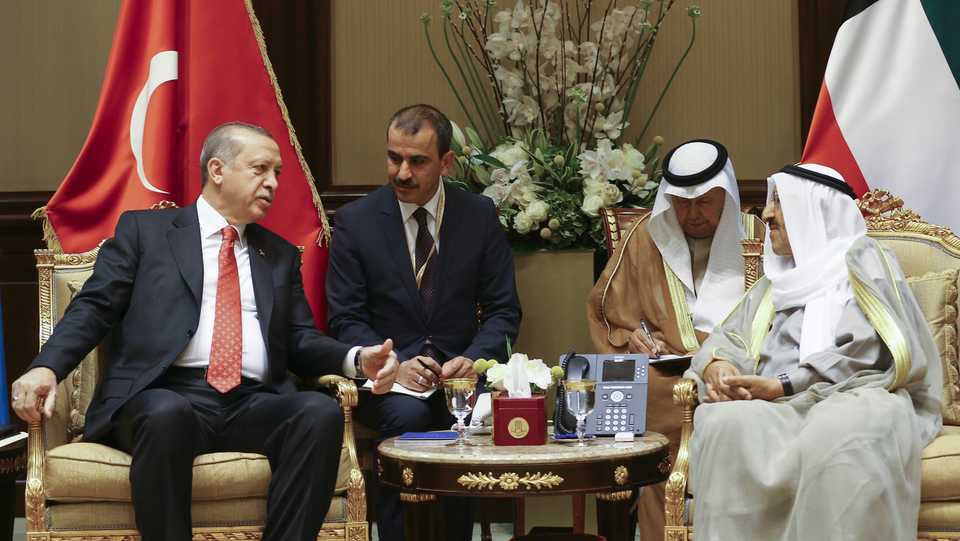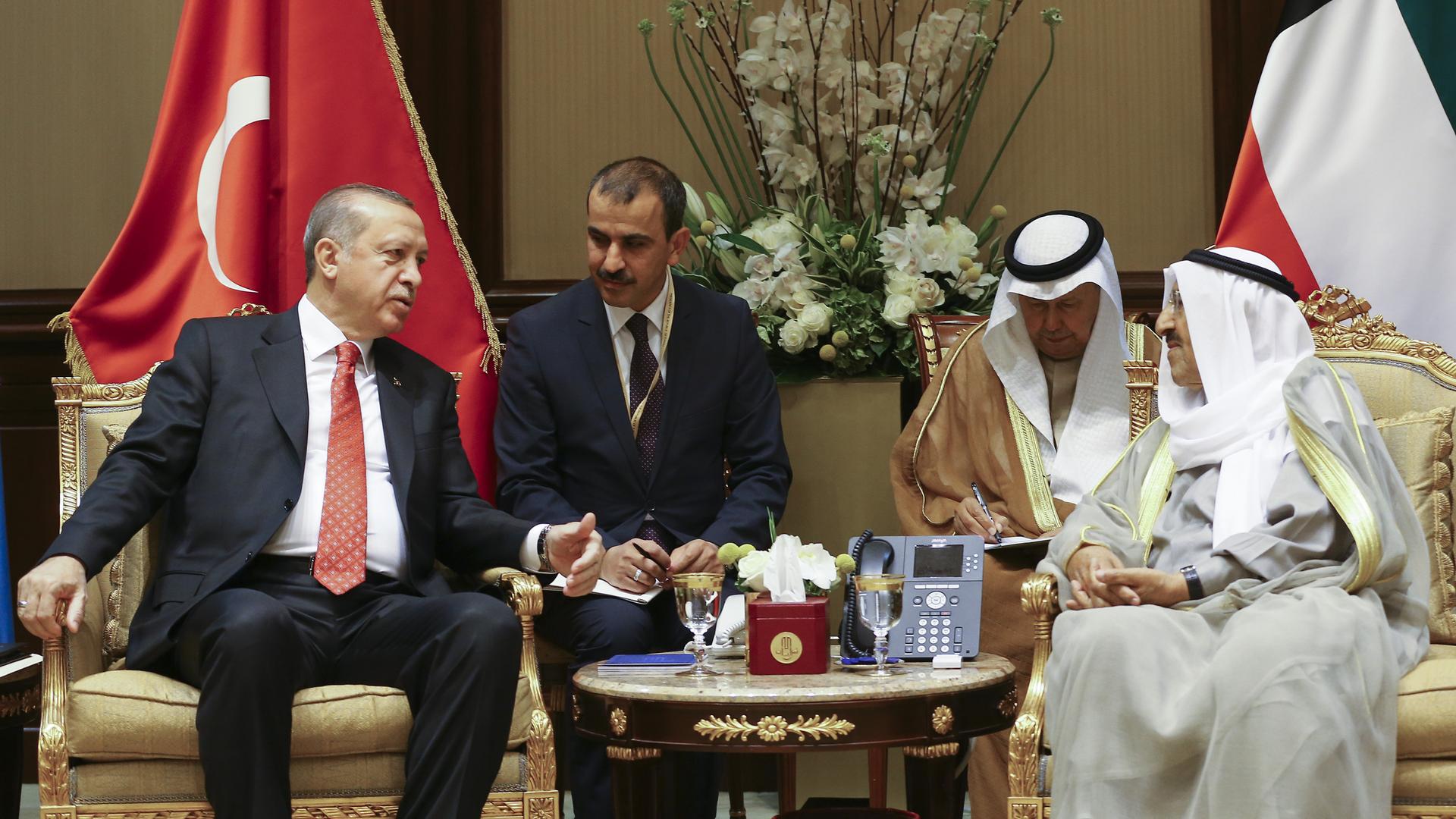
Turkish President Recep Tayyip Erdogan and Kuwaiti Emir Sheikh Sabah al Ahmad al Jaber al Sabah met in the Kuwaiti capital on Tuesday to discuss regional and international developments as well as bilateral relations between Turkey and the Gulf-Arab countries.
His trip comes at a time when the Middle East is undergoing a tumultuous period ranging from a purge among Saudi Arabia’s political and business elite to a blockade of Qatar and rising tensions between Iran and the Saudis.
Erdogan on Monday said he will discuss a solution to the five-month dispute between Qatar and its Gulf Arab neighbours during a visit to Kuwait.
TRT World’s Hasan Abdullah reports from Ankara.
The meeting between the two leaders was held at Bayan Palace in Kuwait City where Turkey’s relations with Gulf countries also came under discussion.
The two leaders also witnessed a signing ceremony of a memorandum of understanding (MoU) for incentives on direct investment and cooperation protocol on science and technology, following the meeting.
Earlier, Erdogan met Kuwaiti Prime Minister Jaber al Mubarak al Hamad al Sabah and parliament speaker Marzouq al Ghanim.
He was accompanied by a large delegation including his wife, Emine Erdogan, Chief of General Staff General Hulusi Akar, Justice Minister Abdulhamit Gul, Foreign Minister Mevlut Cavusoglu, Economy Minister Nihat Zeybekci and Energy Minister Berat Albayrak.
On Monday, Kuwaiti Minister of State for Cabinet Affairs Mohammad Abdullah al Mubarak al Sabah said Erdogan’s visit would provide an opportunity to exchange views on common issues.
President Erdoğan Receives Kuwaiti PM Sheikh Jaber Mubarak Al-Hamad Al-Sabah https://t.co/Y5WKiW5slG pic.twitter.com/So88r6AGan
— Turkish Presidency (@trpresidency) November 14, 2017
Diplomatic ties between Turkey and Qatar
Erdogan is scheduled to arrive in Qatar on Tuesday as part of his regional tour.
“We believe that high-level diplomatic visits between Qatar and Turkey are very important and necessary,” ambassador of Qatar to Turkey, Salem bin Mubarak al Shafi, told Anadolu Agency in an interview.
“Such visits maintain the momentum in bilateral relations and help better consult and coordinate on swift changes and regional and international issues,” he added.
“We are satisfied with the level of our relations, especially that relations have overcome very difficult tests during the past two days,” the Qatari envoy said.
He said talks between Erdogan and Qatari leaders are expected to tackle all important issues.
“The visit will undoubtedly dwell on the Gulf crisis and ongoing mediation efforts,” Shafi said.
Saudi Arabia, the United Arab Emirates, Bahrain and Egypt cut diplomatic and transport ties with Doha on June 5, saying Qatar supports regional foe Iran and terrorist groups, a charge Qatar denies.
President Erdoğan’s Visit to Kuwait and Qatar pic.twitter.com/VHPyxm4ZxP
— Turkish Presidency (@trpresidency) November 14, 2017
Turkish mediation
The Qatari diplomat hailed Turkish mediation efforts to resolve the Gulf crisis.
“We highly appreciate the Turkish role and efforts by Turkish officials to resolve the crisis,” he said.
Shafi also thanked Ankara for its support for Kuwaiti mediation to reach a solution to the crisis. “We know that mediation is not an easy thing since there are parties that oppose the Turkish role and others who want it to fail,” he said.
“We thank the Turkish people for their honourable position during the crisis and for their solidarity,” Shafi said.
The Qatari diplomat underlined his country’s readiness to sit to the negotiating table with the blockade states for talks on all outstanding issues.
“But our sovereignty and security are a red line that cannot be compromised or abandoned,” he said.
As for economic ties between Doha and Ankara, the Qatari ambassador said that a deal was in final stages to establish a trade line between Qatar, Turkey and Iran.
Arab countries in row with Qatar
Qatar’s Emir Sheikh Tamim bin Hamad al Thani said on Tuesday that Arab states that had imposed sanctions on his country in June over allegations of supporting terrorism were not interested in a solution to the crisis.
Speaking to members of the Gulf-Arab states Shoura Council, Tamim said his government was preparing for elections to the consultative body. The necessary legislation would be ready in 2018.
“We express our readiness for a compromise within the framework of a dialogue based on mutual respect for sovereignty and common obligations, but on the other hand we recognise that the indicators that come from the blockade states show they do not want to reach a solution,” Tamim said.
The four countries have “put pressure and published rumours and fabrications” against Qatar hosting the World Cup in 2022.
Tamim, who assumed office in 2013 after his father stepped down, also said his government was currently working on the instruments needed for elections, which he said would be ready in 2018. Plans for elections to the 45-member body originally envisaged for 2013 were never carried out.
In his speech, Tamim also said his government was focusing on completing strategic projects to help the country cope with the sanctions imposed by its neighbours, including ports, water and food security, and to encourage investments.










Discussion about this post